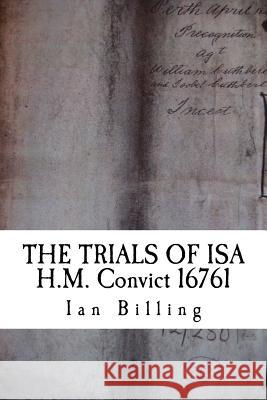The Trials of Isa: H.M. Convict 16761 » książka
The Trials of Isa: H.M. Convict 16761
ISBN-13: 9781518811883 / Angielski / Miękka / 2015 / 104 str.
Isobel Cuthbert's life began unravelling early on a Saturday morning in January, 1840, the middle of harsh Scottish winter. She was shivering and trembling, not with cold, but with fear, desperately seeking safety at the home of a family friend. She said she was afraid of her father. This is the true story of Isobel's downfall, spoken by eye-witnesses. Having run from her home the previous night following some terrifying incident, an incident no-one will ever learn the true nature of, her father was prowling the town that morning, going from house to house trying to track her down, and she was trying to escape him. A little over two years after the day she ran from her father in fear, setting in place a train of events she was to lose any control over, Isobel would be convicted for the capital crime Incest with the man she ran from. This is the factual account of Isobel Cuthbert's crime, arrest, and imprisonment, and of her trial in Perth, Scotland on the 26th April, 1842, a trial from which the public were excluded due to the nature of the charge against her. In these pages we hear the words of the witnesses; family, friends and neighbours, taken directly from the actual evidence prepared for, and used at, that trial. That the full pain of the Law as demanded in the Scottish statutes: Death by hanging, was not visited upon her along with the verdict of Guilt that day in Perth Court of Justice may be due to a remarkable intervention by the fifteen men of the jury, who pleaded clemency on her behalf. Mercy was delivered in the form of a ship, Isa was transported over oceans to the penal colony of Van Diemen's Land for all the years of her natural life. In this work we hear the evidence the jury heard that day and understand the reasons for that most unusual intervention in a prisoner's punishment. We try to understand Isobel's life and the decisions she made, the first to run away from her father, the second to run with him, away from the Law. In order to understand we explore Isobel's domestic life and predicament, along with the legal, religious and social mood of mid-nineteenth century Scotland, and along the way we learn the fate of some other women of Angus accused of capital crimes. We uncover some things which had huge influence in Isa's life, crime, and in her conviction: her actions in running away, all-pervasive religious authority and the occasional powerlessness of the shield of innocence, but more importantly than these and disturbingly, her dangerous, violent father's cruel, cutting, and frequent threats.
Zawartość książki może nie spełniać oczekiwań – reklamacje nie obejmują treści, która mogła nie być redakcyjnie ani merytorycznie opracowana.











